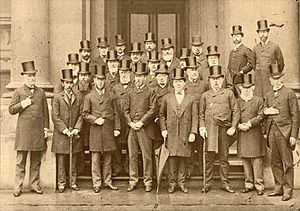1887 Colonial Conference facts for kids
Quick facts for kids 1887 Colonial Conference |
|
|---|---|

Attending representatives.
|
|
| Host country | |
| Dates | 4 April–6 May 1887 |
| Cities | London |
| Chair | Sir Henry Thurston Holland (Secretary of State for the Colonies) |
| Precedes | 1894 |
| Key points | |
|
Imperial co-operation, Naval defence, Pacific telegraph cable, Royal title
|
|
The 1887 Colonial Conference was an important meeting held in London in 1887. It took place during Queen Victoria's Golden Jubilee, which celebrated 50 years of her rule. The main goal of this conference was to bring the United Kingdom and its colonies closer together.
More than 100 people attended the conference. These attendees were mostly unofficial observers from various self-governing colonies and those still dependent on Britain. However, India was not represented at this meeting.
One key outcome was an agreement on naval defense. Colonies like Australia and New Zealand agreed to pay £126,000 each year. This money would help the Royal Navy pay for its ships in the Pacific Ocean. In return, the British government promised not to reduce its naval presence there without the colonies' agreement.
Another important decision was to approve a plan for a telegraph cable. This cable would connect Vancouver in Canada to Australia. The conference also agreed to add to the Queen's official title. She would be called "Queen of the United Kingdom of Great Britain, Ireland, and the Colonies, and all Dependencies thereof, and Empress of India."
It's important to know that the conference was mainly for discussions. Any decisions made were not legally binding. Even so, it was seen as a big step forward. It helped create a formal way for Britain and its colonies to talk about important policies and laws.
Contents
Who Attended the Conference?
The conference was hosted by Queen Victoria and her Prime Minister, Lord Salisbury. Sir Henry Thurston Holland, who was the Secretary of State for the Colonies, led the meetings.
Key Representatives from the British Empire
Leaders and representatives from many colonies attended. These included:
- Newfoundland Colony
- Canada
- Colony of New South Wales
- Colony of Tasmania
- Cape of Good Hope
- South Australia
- Colony of New Zealand
- Victoria
- Queensland
- Western Australia
- Natal Colony
Other colonies were invited to the opening ceremonies. However, their representatives did not participate in the main discussions. William A. Baillie-Hamilton, a key assistant to the Secretary of State for the Colonies, helped organize the conference.
Discussions on Imperial Unity
In his opening speech, Lord Salisbury talked about the importance of colonies helping each other with defense. But he also said that creating a single, unified empire (a "federation") was not practical. He believed it would be too hard to manage everything from one central place. Some colonies even threatened to avoid discussions about such a big change. The delegates mostly agreed on general ideas for working together more closely.
Images for kids
More to Explore
- Imperial Conference - Learn about later meetings of the British Empire.
- All Red Line - Discover the network of telegraph cables that connected the British Empire.
 | Calvin Brent |
 | Walter T. Bailey |
 | Martha Cassell Thompson |
 | Alberta Jeannette Cassell |


